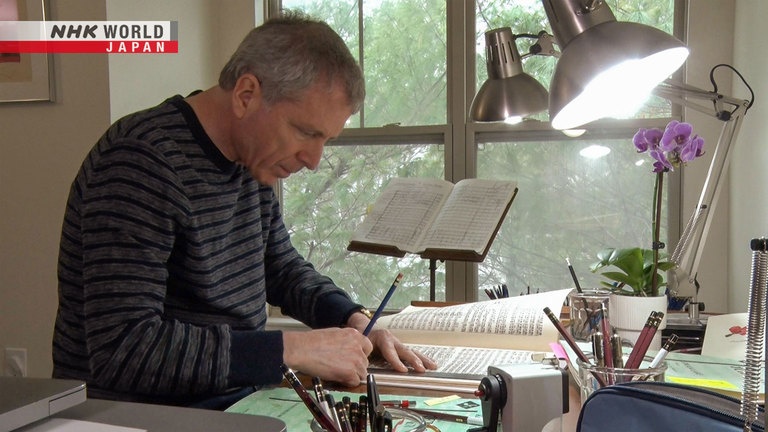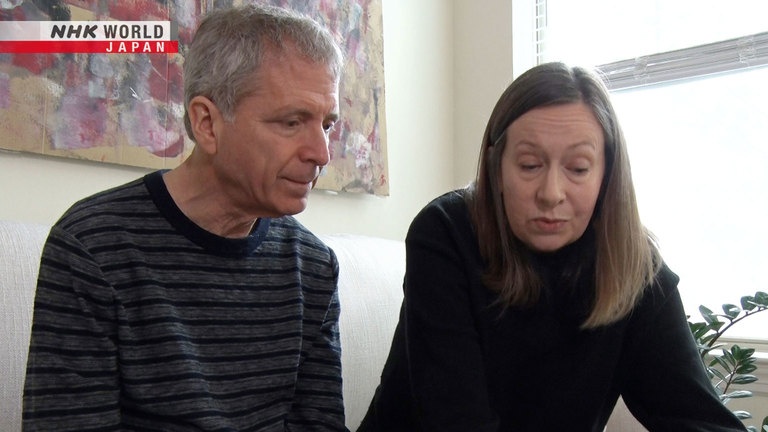Fighting Stigma Through Music: Ronald Braunstein / Conductor and Founder of Me2
Accomplished conductor Ronald Braunstein founded an orchestra to help classical musicians with mental illness. Diagnosed with bipolar disorder himself, he wants to eliminate stigmas for all.




Transcript
Direct Talk
Music is said to have the power
to heal the soul.
Nonetheless, with the fierce
competition to rise to the top,
it is easy for musicians
to succumb to mental illness.
Conductor Ronald Braunstein
is all too familiar with this experience.
At the peak of his career,
Braunstein was diagnosed
with bipolar disorder.
After years of struggle, he founded
this orchestra for musicians like him.
With his non-profit organization, Me2,
Braunstein has provided a space
where musicians with mental illness
can perform without facing stigma.
The initiative has generated
significant attention
as one of the first of its kind in the world.
Braunstein uses music's power
to help people with mental illness.
We asked him about
the importance of eliminating stigma.
Fighting Stigma Through Music
In the orchestra, we have people living with
bipolar disorder, schizophrenia,
depression, virtually
every possible type of mental illness.
And they
really try to understand each other,
not judge each other.
you know, compared to all of the other
uptight
orchestras that I'd ever conducted.
This was one that was like
this wonderful open space,
that I could be myself
that I didn't have to hide anything.
Me2's flagship orchestra is a full-scale group
of about 50 members, based in Boston.
Every week they gather
to practice classical music pieces
under the guidance of Braunstein.
It's kind of sentence.
Para-pan, para-pan...
And another sentence...but, OK.
Members range from amateur players
who have studied music,
to those with full-fledged
professional experience.
The atmosphere is welcoming
and without pressure,
and musicians are able to
express themselves freely.
We're happy to accommodate you.
However...
You couple of... I just want to know
if that is the final destination.
- I just got a little bit shuuuu.
- That was, it was fine.
The orchestra performs
publicly around Boston area
usually for free.
We don't have auditions, because
we don't want to exclude anyone.
And auditions, it's as kind of pressure
that most people,
all people experience, however,
people with mental illness,
they really could experience great anxiety.
I maintain the level of
performance by using all the
methods at my disposal.
I sing to them, I show them with my hands,
I tell them about
the history of the composers,
There's also a lot of mentoring between
some of the people who really,
who really know what they're talking about.
And then they take under their wing.
Classical music has always been
a passion for Ronald Braunstein.
He studied at the prestigious
Juilliard School of Music.
At the age of 23, he became the first American
to win the world-renowned Herbert von
Karajan International Conducting Competition.
His future success fulfilled
the promise of the prize.
He was invited to conduct
famous symphony orchestras
in Tokyo, Berlin, Oslo
and other places around the world.
After winning the competition,
I was just shocked.
I never thought that I could do this
half of the repertoire I had never done.
I stayed up every night,
studying through the night
to learn for the round for the next morning.
And I wasn't sleeping much
and I wasn't eating much.
And that really
makes your memory razor sharp.
I felt
I can do anything.
And I could learn a symphony overnight.
To start conducting
is not the point as much as
to connect with the people.
Because it's not just music.
It's connecting with human beings.
That's what's most important.
But Braunstein's heyday was cut short
abruptly when he was in his thirties.
On a visit to a psychiatrist,
he was diagnosed with bipolar disorder.
After a while, my performances
started to become erratic.
And people began to lose confidence in me.
And
because I was so eccentric, very eccentric.
When I heard that I had bipolar disorder
two things happened.
One was
how shall I say?
I was relieved or actually happy
that I could somehow explain
what was happening with me,
to myself and to others.
I thought this was just great.
And I was just running down the street
to my manager's office,
and I told him about it.
And I was expecting him to be,
oh, good, now we can help you.
But his face kind of turned to ice.
And he dropped me.
So that was a big deal.
You know, because
I really kind of got blacklisted.
And I found it took a very long time
to build up my career again.
And then I would have another relapse.
So it was constantly going up and then
falling down and going up and falling down.
The situation became
so difficult for Braunstein
that one point, he even
embarked on a different career.
But he was always drawn back to music.
I had a position with an orchestra.
And
things were going well until fondly someone
found out that I had bipolar disorder.
And because of their fear of that
they got afraid.
And they let me go
very, very quickly.
So I said
to myself,
I don't want to go back into
the straight music world again.
Because that doesn't allow me
enough space to be myself.
Eventually, Braunstein came up with the idea
of creating an orchestra
for musicians like him,
with mental illness.
Around the same time,
he found a powerful advocate —
his future wife, Caroline Whiddon.
She was the executive director
of a youth orchestra,
and had been diagnosed with
depression decades earlier.
In 2011, they established
their non-profit together.
They named it Me2,
because when he started talking
to fellow musicians about the idea,
many of them said "Me too", sharing that
they, too, lived with mental illness.
Playing together,
Braunstein and his fellow musicians
have experienced the
healing power of music.
Members have not only discovered
their passion for music once again,
but also regained confidence
in other aspects of their lives.
Me2 has now expanded to
other cities in the United States
with 3 orchestras and 2 music groups.
Usually, a bad orchestra
is a quiet orchestra.
They just sit there and
they do what they're told.
And that's that.
But our orchestra is completely different.
We'll start a rehearsal
with a breathing exercise,
so that everyone breathes in together.
And then they breathe out together to
kind of bring everyone into the same space.
In that zone, everyone is
very, very comfortable.
And
there's a lot of laughter and joking,
because we know each other so well.
And we know each other's truth.
When I'm studying a score, there is
no mental illness in my head anymore.
Because Beethoven, it fills your head,
there's no space or you can,
for anxiety or depression or
when you are focused on score,
or orchestra, same thing,
when we come together, stigma free zone,
not judging, not trying to beat anybody.
They experienced the same thing.
As a result of being in me2,
people start to feel more confident
and more sure of themselves.
Some of them get jobs
in an entirely different area,
which they find much more enjoyable.
Some of them one in particular,
he felt that
working in Me2
helped him repair
his relationship with his family.
Some very profound changes.
Braunstein hopes that when
audiences see performances by Me2,
it will open their minds up
to people with mental illness.
Performances often include
breaks in the music,
where orchestra members
can address the audience,
sharing their own experiences.
Our music is our products
of our stigma-free zone.
I want to encourage you to see
how you can apply that in your own groups.
Recently, Braunstein has focused on
sharing the healing power of music
with people in mental hospitals and prisons.
Audience members in
these places often tell him
that it gives them courage
to fight against the stigma they encounter.
Well, I think when they leave, they feel
much more positive about
the people in the orchestra,
I feel that they watch us work together,
they can see the beauty in that, they can
see people who are
working with mental illness
they have a whole new
perspective on mental illness.
It's very very important to us to play music
in untraditional venues
like in a prison for example.
It helps them release themselves
from feeling stigmatized about themselves.
They may have done something wrong
or have an illness or whatever.
But rarely do they get a chance
to experience true beauty.
The other reason is we learn about them.
When we hear them express themselves,
we have a question and answer
and the type of questions that they have.
They truly change our perceptions of them.
We asked Ronald Braunstein what he thinks
about when he conducts music for Me2?
I want everyone to accept each other,
which is being stigma free.
To make progress in eliminating stigma
there's only one thing and
that would be communication,
to keep the conversation going between
people with helped me my mental illness
and people with don't
keep that conversation and
just learn to accept each other.